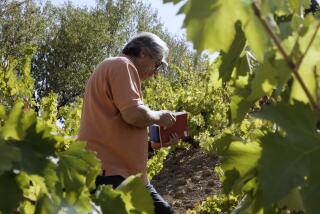WINEMAKING : Moldovans Seek to Join Ranks of Mondavis : World’s only underground wine city ready to stake claim to fame in the West.
- Share via
KRIKOVA, Moldova — The subterranean street signs read “Riesling” and “Cabernet.” A wall sculpture of the god Bacchus reigns over the reception room. And the bottles, barrels and vats stretch forever, lining a vinegar-scented warren of moldy tunnels that extends for 80 miles.
A strange and magical Kingdom of the Grape, the labyrinths under the quarry-and-prison town of Krikova amount to one of the biggest wine cellars in existence.
For Moldova--the tiny, wine-rich former Soviet republic between Ukraine and Romania--they provide a Disneyland-like claim to fame, a typical product of the Kremlin’s love for all things gigantic.
“This is the only underground wine city in the world,” boasted Andrei Kholostenko, director of Moldova’s national wine collection at Krikova. “The police here only work until lunch, because after lunch they’re too drunk.”
From the remains of Nazi leader Hermann Goering’s collection to a 1902 vintage Passover wine, from tasting rooms that have hosted the likes of Soviet leader Leonid I. Brezhnev to the untrammeled kitsch of velvet-wrapped champagne bottles, the cellars of Krikova are full of minor marvels.
If only things above ground were as delightful.
“There are masses of problems,” said Valentin Bodiul, the tough-talking director of the Krikova--sometimes spelled Cricova--cellar and the wine association that supplies it. “All the former Soviet republics are going through tough economic times because of the broken ties. This is a very difficult period.”
For Krikova, broken ties meant that its Ukrainian bottle supplier started charging world prices for clunky bottles that fail to meet world standards. Substitute suppliers in Hungary and Austria had to be found. The Soviet collapse also meant that the loyal Russian and Ukrainian connoisseurs who long considered Moldovan reds among the best were suddenly nearly out of reach--beyond border guards who demanded novelties like customs fees and export permits.
And it turned out that the rest of the world was not exactly holding its breath for a sip of Krikova’s unique red sparkling wine nor its light white Vin Nobil.
*
“When the democratic revolution began and we got sovereignty, our first leaders said ‘We’ll fill the world with our wine,’ ” Bodiul recalled. “That was a dilettante’s approach. The market is full of great wines. And we can expect only a small part of it.”
While Krikova neglected the Russian market, dirt-cheap French and Spanish wines filled it, and the Moldovans are only now regaining their place.
Krikova’s troubles actually began even earlier. In contrast to the Kremlin chiefs who happily sipped and nibbled at Krikova, Soviet leader Mikhail S. Gorbachev launched his famed anti-alcohol campaign soon after coming to power in 1985 and oversaw the destruction of one-third of Moldova’s vineyards--almost 200,000 acres, Bodiul said. It will take years, possibly decades, to restore them.
Meanwhile, Moldova is in the midst of a typical post-Communist economic crisis that keeps subsidies to winemakers at a minimum and, Kholostenko said, forces the government to commandeer most of the hard currency that Krikova earns on its exports to buy imported medicines.
Still, Krikova’s management found the money for French champagne-making equipment and plans its own bottling plants; slowly, painstakingly, it is working on developing the quality and image it needs to sell in the West.
Krikova is already beginning to make inroads into the European market and exports more than 1 million bottles per year, mainly of its oaky red wines, to the United States, largely through distributors in the Midwest and Washington, D.C. “It is hard to race against such leading countries as America--especially California,” Bodiul said. But “already today, the factories physically can’t keep up with all the orders of Western firms.”
Krikova has shifted from its tacky, Soviet-era plastic stoppers to Portuguese cork, and touts its lack of chemicals in the health-conscious West.
In the red wine arena, Krikova claims to already be pressuring France’s Bordeaux region. Bodiul said that, at a recent wine competition, some enraged French winemakers accused their Krikova rivals of pouring Bordeaux wine into their own bottles, so delicious was the bouquet.
Perhaps in the most promising sign of Krikova’s potential, it is making plans to expand the wine cellars from the current 80 miles to nearly 300. “We’ll suffer another two or three years,” Kholostenko said. “But we’ll get out of this.”
More to Read
Sign up for Essential California
The most important California stories and recommendations in your inbox every morning.
You may occasionally receive promotional content from the Los Angeles Times.













